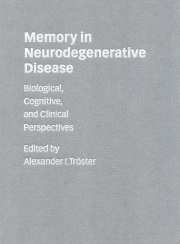Book contents
- Frontmatter
- Contents
- List of contributors
- Preface
- PART I Biological perspectives
- PART II Cognitive perspectives
- PART III Clinical perspectives
- 14 Biological and psychosocial risk factors for dementia and memory loss
- 15 Cross-cultural issues in the neuropsychological assessment of neurodegenerative disease
- 16 Psychometric issues in the clinical assessment of memory in aging and neurodegenerative disease
- 17 The role of memory assessment in the preclinical detection of dementia
- 18 Clinical differentiation of memory disorders in neurodegenerative disease
- 19 The impact of depression on memory in neurodegenerative disease
- 20 Preserved cognitive skills in neurodegenerative disease
- 21 Drug treatment of cognitive impairment in neurodegenerative disease: rationale, current experience and expectations for the future
- 22 Surgical interventions in neurodegenerative disease: impact on memory and cognition
- 23 Memory dysfunction in neurodegenerative disease: ethical and legal issues
- 24 Memory in neurodegenerative disease: clinical perspectives
- Index
16 - Psychometric issues in the clinical assessment of memory in aging and neurodegenerative disease
from PART III - Clinical perspectives
Published online by Cambridge University Press: 23 November 2009
- Frontmatter
- Contents
- List of contributors
- Preface
- PART I Biological perspectives
- PART II Cognitive perspectives
- PART III Clinical perspectives
- 14 Biological and psychosocial risk factors for dementia and memory loss
- 15 Cross-cultural issues in the neuropsychological assessment of neurodegenerative disease
- 16 Psychometric issues in the clinical assessment of memory in aging and neurodegenerative disease
- 17 The role of memory assessment in the preclinical detection of dementia
- 18 Clinical differentiation of memory disorders in neurodegenerative disease
- 19 The impact of depression on memory in neurodegenerative disease
- 20 Preserved cognitive skills in neurodegenerative disease
- 21 Drug treatment of cognitive impairment in neurodegenerative disease: rationale, current experience and expectations for the future
- 22 Surgical interventions in neurodegenerative disease: impact on memory and cognition
- 23 Memory dysfunction in neurodegenerative disease: ethical and legal issues
- 24 Memory in neurodegenerative disease: clinical perspectives
- Index
Summary
INTRODUCTION
The psychometric issues pertaining to the assessment of memory in elderly persons concern the reliability, validity and normative data available for memory tests. This chapter first discusses patient factors that influence the reliability and validity of memory evaluations and then describes the psychometric properties of memory assessment devices commonly used with the elderly. Methods for estimating premorbid memory abilities and detecting possible changes in memory functions are briefly presented.
It is known that older individuals are more likely than the general population to experience visual and auditory deficits and to be more susceptible to fatigue that may impede the evaluation process. To reduce fatigue, frequent breaks should be taken, testing may need to be conducted over several days and/or abbreviated versions of memory tests may need to be considered. Sensory deficits associated with advancing age also need to be considered.
SENSORYPERCEPTUAL FACTORS INFLUENCING MEMORY EVALUATIONS
Visual functions
Visual efficiency tends to decline with advancing age. It has been estimated that 91% of the severely visually impaired are over the age of 45 years and that 68% of the severely visually impaired are 65 years of age and older (Shindell 1989). Although it is good practice to have examinees who wear glasses bring them to the testing session, wearing glasses does not necessarily ensure adequate visual acuity. It is essential that the examiner determine whether each client's vision is sufficient to allow for valid test administration.
- Type
- Chapter
- Information
- Memory in Neurodegenerative DiseaseBiological, Cognitive, and Clinical Perspectives, pp. 262 - 277Publisher: Cambridge University PressPrint publication year: 1998
- 1
- Cited by



